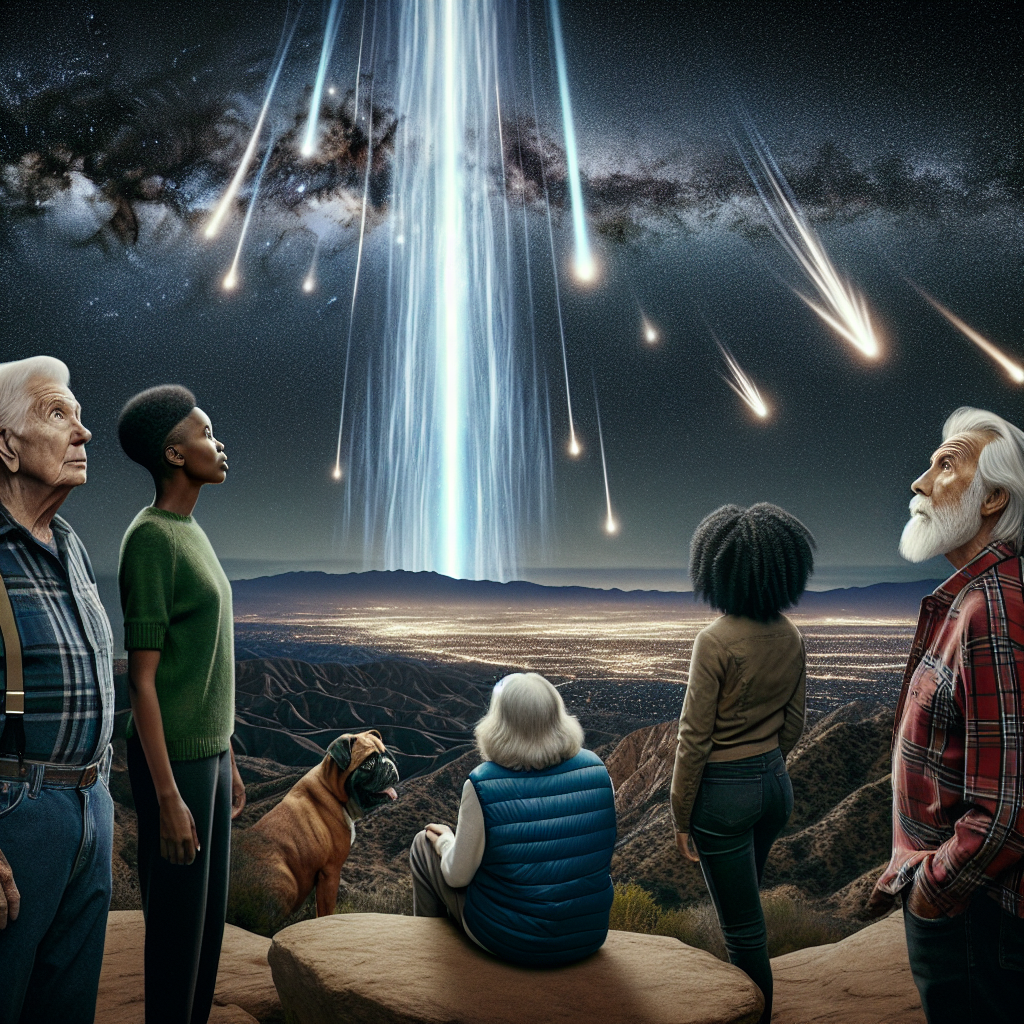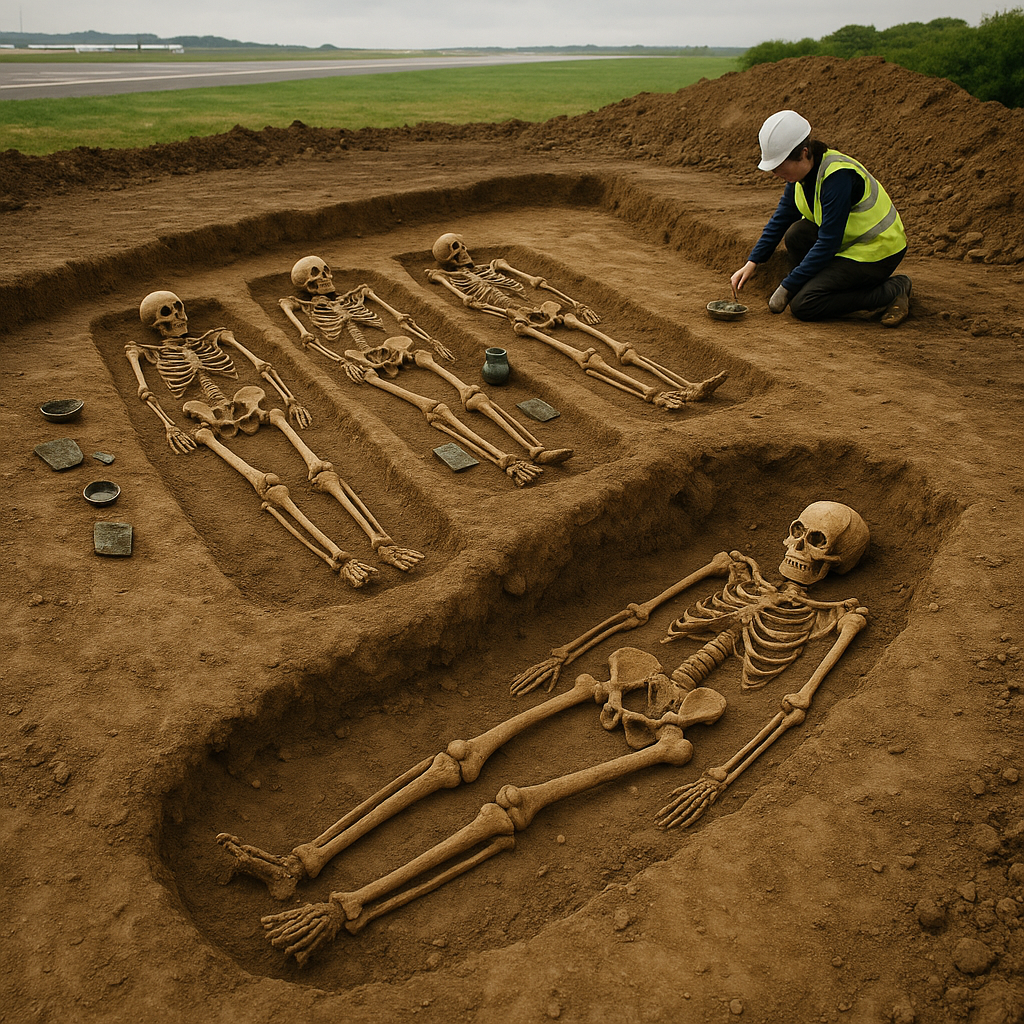In a heartwarming story, a man from Germany named Marius Werner saved the life of a doctor from the UK, Dr. Nick Embleton. Dr. Embleton had a rare type of blood cancer and needed a bone marrow transplant to survive. They couldn’t find a match in the UK, so they searched all over the world. After two years, BBC News and the charity Anthony Nolan helped them find each other. Now, they consider themselves “blood brothers.”
Dr. Embleton has been working in a special unit for babies in Newcastle for more than 20 years. When he found out he had cancer, he was really sad. He thought he might die and even made a will. It was really hard for him to tell his wife and kids. The only way he could survive was with a bone marrow transplant. This is when they take healthy blood cells from someone else and put them into your body. But finding a person who matches is really difficult.
Both the person who donates their cells and the person who gets them have to stay secret until the transplant is done. When Dr. Embleton found out the transplant worked, he wanted to meet the person who saved his life. With the help of Anthony Nolan, they found Marius, who had been on the donor list since he was a teenager. He agreed to meet Dr. Embleton in the UK. They met at a place that helps people with cancer, and they hugged and said thank you to each other.
When they met, Marius said he cried when he found out the transplant worked. He also said that before this, he had a hard time with his mental health and even tried to kill himself. He thinks that saving Dr. Embleton’s life gave him a reason to keep going and helped him find his way in life. Now, they plan to stay in touch as “blood brothers.”
This story shows how important it is to be kind to others, even if you don’t know them. It also shows how much of a difference donating organs and stem cells can make. If you or someone you know is going through something similar, you can get help from BBC Action Line.
Original news source: The strangers who saved each other’s lives (BBC)
🎧 Listen:
Slow
Normal
Fast
📖 Vocabulary:
| 1 | heartwarming | Making you feel happy because of seeing kindness or something good happening |
| 2 | transplant | Moving an organ or tissue from one body to another for medical treatment |
| 3 | rare | Not common or usual; very unusual |
| 4 | charity | An organization that helps people in need or supports good causes |
| 5 | consider | To think of someone or something in a certain way |
| 6 | unit | A specific part of a hospital or clinic that deals with a particular type of patient |
| 7 | will | A legal document that says what should happen to your stuff after you die |
| 8 | survive | To continue to live or exist, especially after coming close to dying or ending |
| 9 | donate | To give something, like blood or an organ, to help someone else |
| 10 | secret | Kept hidden or not known by others |
| 11 | mental health | The condition of your mind and how you feel emotionally |
| 12 | reason | A cause or explanation for something |
| 13 | difference | The way in which one thing is not the same as another or changes something |
| 14 | donating | The act of giving something, especially parts of your body, to help someone else |
| 15 | similar | Having qualities or features that are almost the same as another person or thing |
Group or Classroom Activities
Warm-up Activities:
– News Summary
Instructions: Divide the class into pairs or small groups. Each group will read the article and then create a summary of the main points. They should focus on the key details and try to condense the article into a few sentences. Afterward, each group can present their summary to the class.
– Opinion Poll
Instructions: Prepare a list of questions related to the article, such as “Do you think it’s important to donate organs?” or “Have you ever had a personal experience with cancer?” Have the students move around the room and ask their classmates the questions. They should record their classmates’ answers and then share the results with the class.
– Vocabulary Pictionary
Instructions: Create a list of vocabulary words from the article, such as “transplant,” “donate,” and “cancer.” Divide the class into teams. One student from each team will come to the front of the class and draw a picture representing one of the vocabulary words. The rest of their team will try to guess the word based on the picture. The team that guesses correctly gets a point.
– Pros and Cons
Instructions: Divide the class into two groups. One group will discuss the pros of organ donation and the other group will discuss the cons. Give them a few minutes to brainstorm their ideas, and then have a debate where each group presents their arguments. Encourage students to use evidence from the article to support their points.
– Future Predictions
Instructions: In pairs or small groups, have the students discuss and make predictions about what might happen in the future for the two individuals in the article. For example, “Do you think they will continue to stay in touch?” or “Will Marius continue to be an advocate for organ donation?” Afterward, have a class discussion where students share their predictions and explain their reasoning.
🤔 Comprehension Questions:
1. Who is the man from Germany who saved the life of a doctor from the UK?
2. Why did Dr. Nick Embleton need a bone marrow transplant?
3. How long has Dr. Embleton been working in a special unit for babies in Newcastle?
4. Why was it difficult for Dr. Embleton to tell his wife and kids about his cancer?
5. What is a bone marrow transplant?
6. Why do the donor and recipient of a bone marrow transplant have to stay secret?
7. How did Marius feel when he found out the transplant worked?
8. What is the main message of this story?
Go to answers ⇩
🎧✍️ Listen and Fill in the Gaps:
In a heartwarming story, a man from Germany named Marius Werner saved the life of a doctor from the UK, Dr. Nick Embleton. Dr. Embleton had a rare type of (1)______ cancer and needed a bone marrow transplant to (2)______. They couldn’t find a match in the UK, so they searched all over the (3)______. After two years, BBC News and the charity Anthony Nolan helped them find each other. Now, they (4)______ themselves “blood brothers.”
Dr. Embleton has been working in a special unit for babies in Newcastle for more than 20 years. When he found out he had cancer, he was really sad. He thought he might die and even made a will. It was really hard for him to tell his wife and kids. The only way he could survive was with a bone marrow transplant. This is when they take healthy blood (5)______ from someone else and put them into your body. But finding a (6)______ who (7)______ is really difficult.
Both the person who donates their cells and the person who gets them have to stay (8)______ until the transplant is done. When Dr. (9)______ found out the (10)______ worked, he wanted to meet the person who (11)______ his life. With the help of Anthony Nolan, they found Marius, who had been on the donor list since he was a teenager. He agreed to meet Dr. Embleton in the UK. They met at a place that helps people with cancer, and they hugged and said (12)______ you to each other.
When they met, Marius said he cried when he found out the transplant worked. He also said that before this, he had a hard time with his mental (13)______ and even tried to kill himself. He thinks that saving Dr. Embleton’s life gave him a reason to keep (14)______ and helped him find his way in life. Now, they plan to stay in touch as “blood brothers.”
This (15)______ shows how important it is to be kind to others, even if you don’t know them. It also shows how much of a difference donating organs and stem cells can make. If you or someone you know is going through something (16)______, you can get help from BBC Action Line.
Go to answers ⇩
💬 Discussion Questions:
Students can ask a partner these questions, or discuss them as a group.
1. What is a bone marrow transplant and why is it important for someone with blood cancer?
2. How do you think Dr. Embleton felt when he found out he had cancer? Why?
3. How would you feel if you were in Dr. Embleton’s position and had to tell your family about your illness?
4. Do you think it’s difficult to find a person who matches for a bone marrow transplant? Why or why not?
5. What is the significance of keeping the donor and recipient’s identities secret until the transplant is done?
6. How do you think Marius felt when he found out that the transplant worked and he saved someone’s life?
7. Why do you think Marius said that saving Dr. Embleton’s life gave him a reason to keep going and helped him find his way in life?
8. How important do you think it is to be kind to others, even if you don’t know them? Why?
9. Do you know anyone who has donated organs or stem cells? How do you think their actions can make a difference?
10. Have you ever been in a situation where you needed help from someone you didn’t know? How did it make you feel?
11. How do you think meeting Marius and expressing gratitude made Dr. Embleton feel?
12. Why do you think the story mentions that Marius had a hard time with his mental health before saving Dr. Embleton’s life?
13. How do you think Marius and Dr. Embleton will stay in touch as “blood brothers”?
14. What other ways can you think of to help people who are going through difficult times?
15. Do you think it’s important for stories like this to be shared in the media? Why or why not?
Individual Activities
📖💭 Vocabulary Meanings:
Match each word to its meaning.
Words:
1. heartwarming
2. transplant
3. rare
4. charity
5. consider
6. unit
7. will
8. survive
9. donate
10. secret
11. mental health
12. reason
13. difference
14. donating
15. similar
Meanings:
(A) Not common or usual; very unusual
(B) The way in which one thing is not the same as another or changes something
(C) To give something, like blood or an organ, to help someone else
(D) A specific part of a hospital or clinic that deals with a particular type of patient
(E) An organization that helps people in need or supports good causes
(F) Moving an organ or tissue from one body to another for medical treatment
(G) Making you feel happy because of seeing kindness or something good happening
(H) Kept hidden or not known by others
(I) The act of giving something, especially parts of your body, to help someone else
(J) The condition of your mind and how you feel emotionally
(K) To think of someone or something in a certain way
(L) A cause or explanation for something
(M) Having qualities or features that are almost the same as another person or thing
(N) To continue to live or exist, especially after coming close to dying or ending
(O) A legal document that says what should happen to your stuff after you die
Go to answers ⇩
🔡 Multiple Choice Questions:
1. What did Marius Werner do to save Dr. Nick Embleton’s life?
(a) Donated bone marrow
(b) Found a match in the UK
(c) Started a charity
(d) Became a doctor
2. Why did Dr. Embleton need a bone marrow transplant?
(a) He wanted to help Marius Werner
(b) He wanted to become a doctor
(c) He needed healthy blood cells
(d) He had a rare type of blood cancer
3. How long had Dr. Embleton been working in the special unit for babies?
(a) Less than 5 years
(b) More than 20 years
(c) Exactly 10 years
(d) He had never worked with babies
4. What did Dr. Embleton do when he found out he had cancer?
(a) Made a will
(b) Told his wife and kids
(c) Started a charity
(d) Went on a vacation
5. What is a bone marrow transplant?
(a) When a doctor removes your bones
(b) When healthy blood cells are put into your body
(c) When you receive a new heart
(d) When you donate your blood
6. Why did Marius cry when he found out the transplant worked?
(a) He was sad because he was sick
(b) He was scared of the transplant
(c) He was angry at Dr. Embleton
(d) He was happy that he saved a life
7. What did Marius say about his mental health before the transplant?
(a) He was always happy and never had any problems
(b) He was scared of doctors
(c) He had a hard time and tried to kill himself
(d) He didn’t have any mental health issues
8. What lesson can we learn from this story?
(a) Doctors are heroes
(b) Stem cells are not important
(c) It is important to be kind to others
(d) Marius is a famous person
Go to answers ⇩
🕵️ True or False Questions:
1. A man named Marius Werner from France saved the life of a UK doctor named Dr. Nick Embleton by donating his blood.
2. Dr. Embleton has been working in a special unit for babies in Newcastle for over 20 years.
3. They found a match for the transplant in the UK, so they only searched locally for a donor.
4. Marius had been on the donor list since he was a child and agreed to meet Dr. Embleton in Germany.
5. Marius believes that saving Dr. Embleton’s life gave him a reason to keep going and helped him find his way in life.
6. After two years, BBC News and the charity Anthony Nolan helped connect Marius and Dr. Embleton.
7. When Dr. Embleton found out the transplant was unsuccessful, he wanted to meet Marius and discuss what went wrong.
8. Dr. Embleton had a rare type of blood cancer and needed a bone marrow transplant to survive.
Go to answers ⇩
📝 Write a Summary:
Write a summary of this news article in two sentences.
Check your writing now with the best free AI for English writing!
Writing Questions:
Answer the following questions. Write as much as you can for each answer.
Check your answers with our free English writing assistant!
1. Who is Marius Werner and how did he save Dr. Nick Embleton’s life?
2. Why was it difficult for Dr. Embleton to find a bone marrow match in the UK?
3. How did Dr. Embleton feel when he found out the transplant worked?
4. What impact did saving Dr. Embleton’s life have on Marius Werner?
5. What is the main message of this story?
✅ Answers
🤔✅ Comprehension Question Answers:
1. Who is the man from Germany who saved the life of a doctor from the UK?
The man from Germany who saved the life of the doctor from the UK is Marius Werner.
2. Why did Dr. Nick Embleton need a bone marrow transplant?
Dr. Nick Embleton needed a bone marrow transplant because he had a rare type of blood cancer and it was the only way for him to survive.
3. How long has Dr. Embleton been working in a special unit for babies in Newcastle?
Dr. Embleton has been working in a special unit for babies in Newcastle for more than 20 years.
4. Why was it difficult for Dr. Embleton to tell his wife and kids about his cancer?
It was difficult for Dr. Embleton to tell his wife and kids about his cancer because he was really sad and thought he might die. He even made a will, which made it harder for him to share the news with his family.
5. What is a bone marrow transplant?
A bone marrow transplant is a medical procedure where healthy blood cells from a donor are taken and put into the body of a person who needs them. It is often used to treat certain types of cancer or other serious blood disorders.
6. Why do the donor and recipient of a bone marrow transplant have to stay secret?
The donor and recipient of a bone marrow transplant have to stay secret until the transplant is done to protect their privacy and ensure their safety.
7. How did Marius feel when he found out the transplant worked?
Marius felt emotional and cried when he found out the transplant worked. It was a moment of relief and happiness for him.
8. What is the main message of this story?
The main message of this story is the importance of kindness and the impact that organ and stem cell donations can have on someone’s life. It also highlights the importance of reaching out for help when going through difficult times.
Go back to questions ⇧
🎧✍️✅ Listen and Fill in the Gaps Answers:
(1) blood
(2) survive
(3) world
(4) consider
(5) cells
(6) person
(7) matches
(8) secret
(9) Embleton
(10) transplant
(11) saved
(12) thank
(13) health
(14) going
(15) story
(16) similar
Go back to questions ⇧
📖💭✅ Vocabulary Meanings Answers:
1. heartwarming
Answer: (G) Making you feel happy because of seeing kindness or something good happening
2. transplant
Answer: (F) Moving an organ or tissue from one body to another for medical treatment
3. rare
Answer: (A) Not common or usual; very unusual
4. charity
Answer: (E) An organization that helps people in need or supports good causes
5. consider
Answer: (K) To think of someone or something in a certain way
6. unit
Answer: (D) A specific part of a hospital or clinic that deals with a particular type of patient
7. will
Answer: (O) A legal document that says what should happen to your stuff after you die
8. survive
Answer: (N) To continue to live or exist, especially after coming close to dying or ending
9. donate
Answer: (C) To give something, like blood or an organ, to help someone else
10. secret
Answer: (H) Kept hidden or not known by others
11. mental health
Answer: (J) The condition of your mind and how you feel emotionally
12. reason
Answer: (L) A cause or explanation for something
13. difference
Answer: (B) The way in which one thing is not the same as another or changes something
14. donating
Answer: (I) The act of giving something, especially parts of your body, to help someone else
15. similar
Answer: (M) Having qualities or features that are almost the same as another person or thing
Go back to questions ⇧
🔡✅ Multiple Choice Answers:
1. What did Marius Werner do to save Dr. Nick Embleton’s life?
Answer: (a) Donated bone marrow
2. Why did Dr. Embleton need a bone marrow transplant?
Answer: (d) He had a rare type of blood cancer
3. How long had Dr. Embleton been working in the special unit for babies?
Answer: (b) More than 20 years
4. What did Dr. Embleton do when he found out he had cancer?
Answer: (a) Made a will
5. What is a bone marrow transplant?
Answer: (b) When healthy blood cells are put into your body
6. Why did Marius cry when he found out the transplant worked?
Answer: (d) He was happy that he saved a life
7. What did Marius say about his mental health before the transplant?
Answer: (c) He had a hard time and tried to kill himself
8. What lesson can we learn from this story?
Answer: (c) It is important to be kind to others
Go back to questions ⇧
🕵️✅ True or False Answers:
1. A man named Marius Werner from France saved the life of a UK doctor named Dr. Nick Embleton by donating his blood. (Answer: False)
2. Dr. Embleton has been working in a special unit for babies in Newcastle for over 20 years. (Answer: True)
3. They found a match for the transplant in the UK, so they only searched locally for a donor. (Answer: False)
4. Marius had been on the donor list since he was a child and agreed to meet Dr. Embleton in Germany. (Answer: False)
5. Marius believes that saving Dr. Embleton’s life gave him a reason to keep going and helped him find his way in life. (Answer: True)
6. After two years, BBC News and the charity Anthony Nolan helped connect Marius and Dr. Embleton. (Answer: True)
7. When Dr. Embleton found out the transplant was unsuccessful, he wanted to meet Marius and discuss what went wrong. (Answer: False)
8. Dr. Embleton had a rare type of blood cancer and needed a bone marrow transplant to survive. (Answer: True)
Go back to questions ⇧















